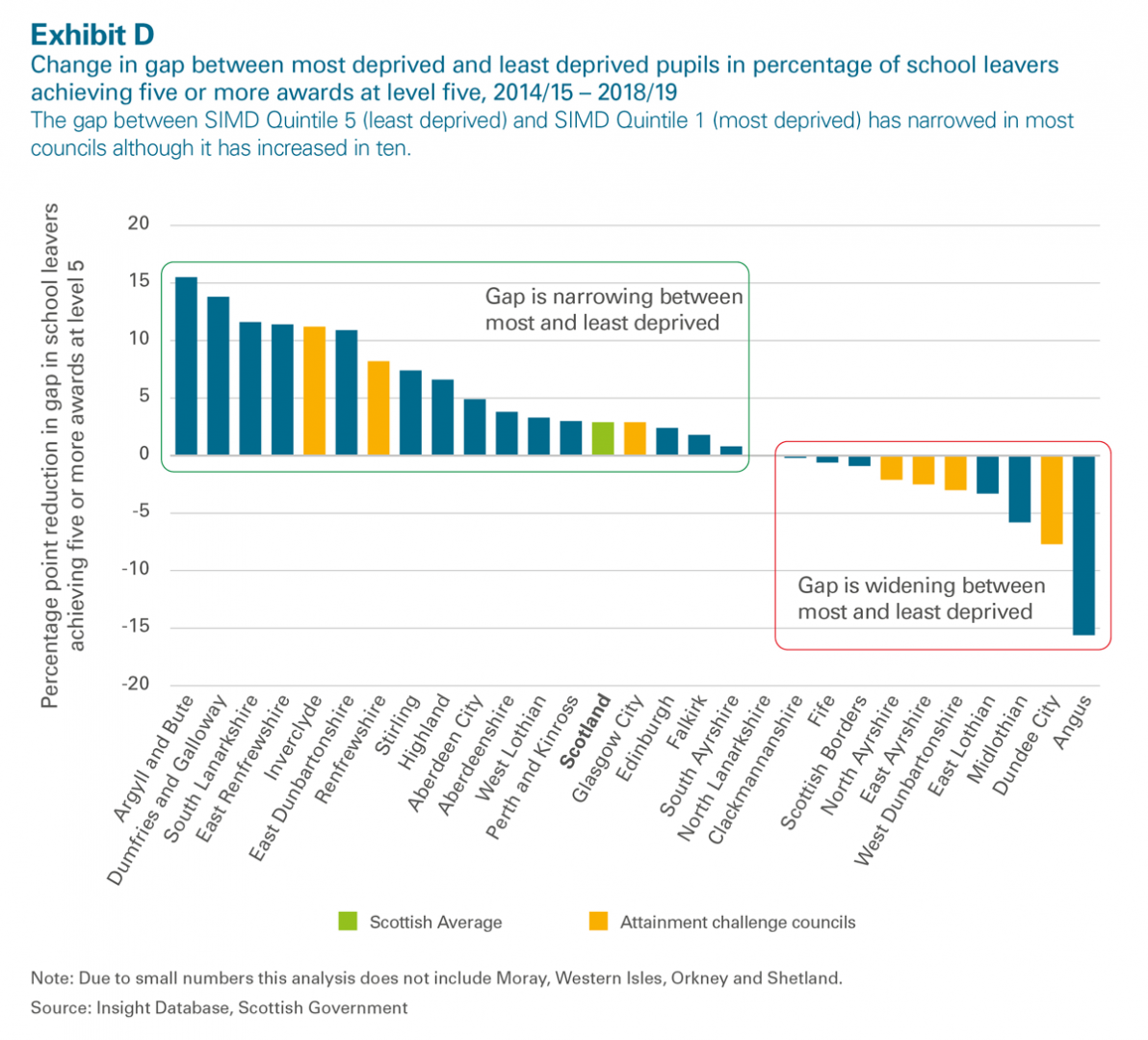Progress on closing the attainment gap ‘limited’

A new report from Scotland’s auditor general has found that progress on closing the attainment gap between advantaged and disadvantaged pupils is “limited” and “falls short of the Scottish government’s aims”.
The Audit Scotland report - published today as the current iteration of the Scottish Attainment Challenge comes to a close - says going forward improvement needs to happen more quickly and there needs to be greater consistency across the country.
The report finds that although at a national level exam, performance and other attainment measures have improved, the rate of improvement up until 2018-19 has been inconsistent across different measures.
Government report: Progress in closing the attainment gap is ‘varied’
Poverty: Why closing the attainment gap is about more than school
News: Huge challenge of closing attainment gap is laid bare
Short read: Closing the gap? Scotland lacks the data to know
There is “wide variation in education performance across councils”, it says, with evidence of worsening performance on some indicators in some councils - including councils targeted by the Scottish Attainment Challenge (SAC), which was launched by the Scottish government in 2015 and which has invested £736 million to date in raising the attainment of Scotland’s most disadvantaged young people.
The report focuses on attainment before the disruption caused by the coronavirus pandemic, given the “data gaps” following the cancellation of the 2020 Scottish Qualifications Authority exams.
In the senior phase of secondary, the report examines four key indicators: percentage of school leavers achieving one award or more at National 5 level or better; those achieving five awards or more at N5 level or better; percentage of 16- to 19-year-olds participating in education employment or training; and percentage of school leavers achieving level 4 literacy and numeracy.
Fewer than half of councils saw their performance improve on all four key indicators (13 out of 32 councils) between 2013-14 and 2018-19, the report finds.
“The poverty-related attainment gap has to close faster.” My new report on #school education with @AccCommScot - out today: https://t.co/ZNrd6hcTH2 pic.twitter.com/Wzd2jgxwXJ
- Stephen Boyle (@AuditorGenScot) March 23, 2021
When it comes to the percentage of school leavers achieving one or more awards at N5 level or above, the report finds, performance declined in 13 councils over the period. Four of the councils that saw a decline were the so-called “challenge authorities”, which have received more attainment challenge funding owing to higher levels of deprivation.
Between 2014-15 and 2018-19 the gap between the proportion of pupils from the most and least deprived areas leaving school with five awards at N5 level narrowed in most councils, but it widened in 10.
 The report, Improving outcomes for young people through school education, says: “The poverty-related attainment gap remains wide and inequalities have been exacerbated by Covid-19. Progress on closing the gap has been limited and falls short of the Scottish government’s aims. Improvement needs to happen more quickly and there needs to be greater consistency across the country. The government and councils recognise that addressing inequalities must be at the heart of the response to Covid-19, longer-term recovery and improving education.”
The report, Improving outcomes for young people through school education, says: “The poverty-related attainment gap remains wide and inequalities have been exacerbated by Covid-19. Progress on closing the gap has been limited and falls short of the Scottish government’s aims. Improvement needs to happen more quickly and there needs to be greater consistency across the country. The government and councils recognise that addressing inequalities must be at the heart of the response to Covid-19, longer-term recovery and improving education.”
The report acknowledges that schools are about more than exams and there has been an increase in the types of pathways, awards and qualifications available to pupils, but it says the data when it comes to these qualifications is “less comprehensive than the more traditional attainment measures and has less prominence”. It also says that better data is needed to understand if other important broad outcomes, like wellbeing and self-confidence, are improving.
It points out that almost all councils offer the Duke of Edinburgh’s Award but that this is “not reflected in the Scottish Qualification Authority’s (SQA) awards data as it is not accredited”.
The report says: “Focusing on exam performance is important but needs to be balanced by an understanding of wider outcomes and recognition of their value. An emphasis on measures of attainment in exams, while important, fails to recognise and promote the broader aims of [Curriculum for Excellence] and value the wider achievements of young people.”
According to the report “deprivation alone does not account for all variation in council performance”.
It finds there are a huge variations between councils in terms of the proportion of pupils from the most and least deprived areas who leave school with five or more awards at level 5 (equivalent to National 5).
In 2018-19, in some councils, just 26.5 per cent of school leavers from the most deprived areas achieved five awards at level five, but in other council areas that figure was over 70 per cent (71.5 per cent).
In the case of school leavers from the least deprived areas, performance ranged from 72.7 per cent to 93.6 per cent.
The report also finds “there is wide variation in councils’ spending per pupil but no link between that and attainment levels”.
On average, councils spend around 28 per cent of their budgets on school education (excluding early learning and childcare, special schools and community learning) but that varies from 20.2 per cent in Glasgow and 18.8 per cent in Shetland, to 40.1 per cent in East Renfrewshire.
The report says: “Given the level of resource that has been targeted through the ASF [Attainment Scotland Fund] and the slow rate of improvement in attainment, if the ASF continues in some form beyond the current funding period, the Scottish government needs to be clearer about the anticipated pace of change, identify and measure against appropriate milestones, and consider the lessons about what works in determining how funding is directed.”
Commenting on the report’s findings, the auditor general warned that the pandemic could exacerbate inequalities within the education system.
Stephen Boyle, auditor general for Scotland, said significantly reducing the attainment gap is complex. However, he also stressed “the pace of improvement has to increase”.
The SAC was funded for the duration of the current Scottish Parliament. Now, with the Scottish Parliament election on 6 May approaching, the report says the government is developing its plans to replace the SAC. It finds councils are warning that “they will face significant challenges if they no longer have it”.
However, in a government report published yesterday, looking at progress towards closing the attainment gap from 2016 to the present, education secretary John Swinney stressed in his foreword the government’s “unwavering commitment” to closing the gap, saying it would continue “beyond 2021-22”.
He said over £200 million in Attainment Scotland Funding had already been committed in 2021-22.
Responding to the Audit Scotland report, the EIS teaching union said schools did all they could to support young people living in poverty but resources were insufficient and they could not overcome “such serious societal issues as inequality and poverty” alone.
EIS general secretary Larry Flanagan added: “It is clear that much greater and sustained investment is needed to tackle the impact of poverty on young people’s education, and all of Scotland’s political parties must fully commit to tackling this issue in the context of education recovery during the next Parliament.”
You need a Tes subscription to read this article
Subscribe now to read this article and get other subscriber-only content:
- Unlimited access to all Tes magazine content
- Exclusive subscriber-only stories
- Award-winning email newsletters
Already a subscriber? Log in
You need a subscription to read this article
Subscribe now to read this article and get other subscriber-only content, including:
- Unlimited access to all Tes magazine content
- Exclusive subscriber-only stories
- Award-winning email newsletters



